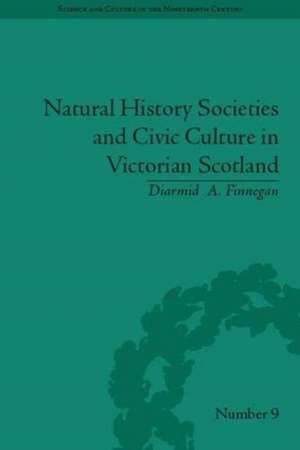Natural History Societies and Civic Culture in Victorian Scotland: Sci & Culture in the Nineteenth Century
Autor Diarmid A. Finneganen Limba Engleză Paperback – 4 iun 2021
Winner of the Frank Watson Prize in Scottish History, 2011
The relationship between science and civil society is essential to our understanding of cultural change during the Victorian era. Science was frequently packaged as an appropriate form of civic culture, inculcating virtues necessary for civic progress. In turn, civic culture was presented as an appropriate context for enabling and supporting scientific progress. Finnegan's study looks at the shifting nature of this process during the nineteenth century, using Scotland as the focus for his argument. Considerations of class, religion and gender are explored, illuminating changing social identities as public interest in science was allowed—even encouraged—beyond the environs of universities and elite metropolitan societies.
The relationship between science and civil society is essential to our understanding of cultural change during the Victorian era. Science was frequently packaged as an appropriate form of civic culture, inculcating virtues necessary for civic progress. In turn, civic culture was presented as an appropriate context for enabling and supporting scientific progress. Finnegan's study looks at the shifting nature of this process during the nineteenth century, using Scotland as the focus for his argument. Considerations of class, religion and gender are explored, illuminating changing social identities as public interest in science was allowed—even encouraged—beyond the environs of universities and elite metropolitan societies.
Din seria Sci & Culture in the Nineteenth Century
-
 Preț: 428.75 lei
Preț: 428.75 lei -
 Preț: 426.79 lei
Preț: 426.79 lei -
 Preț: 428.75 lei
Preț: 428.75 lei -
 Preț: 351.61 lei
Preț: 351.61 lei -
 Preț: 427.39 lei
Preț: 427.39 lei -
 Preț: 502.82 lei
Preț: 502.82 lei -
 Preț: 467.88 lei
Preț: 467.88 lei -
 Preț: 395.54 lei
Preț: 395.54 lei -
 Preț: 434.30 lei
Preț: 434.30 lei -
 Preț: 463.08 lei
Preț: 463.08 lei -
 Preț: 427.77 lei
Preț: 427.77 lei -
 Preț: 392.44 lei
Preț: 392.44 lei -
 Preț: 356.73 lei
Preț: 356.73 lei -
 Preț: 431.62 lei
Preț: 431.62 lei -
 Preț: 432.57 lei
Preț: 432.57 lei -
 Preț: 464.44 lei
Preț: 464.44 lei -
 Preț: 333.49 lei
Preț: 333.49 lei -
 Preț: 229.85 lei
Preț: 229.85 lei -
 Preț: 469.61 lei
Preț: 469.61 lei -
 Preț: 426.79 lei
Preț: 426.79 lei -
 Preț: 501.85 lei
Preț: 501.85 lei -
 Preț: 392.66 lei
Preț: 392.66 lei -
 Preț: 387.82 lei
Preț: 387.82 lei -
 Preț: 391.67 lei
Preț: 391.67 lei -
 Preț: 384.92 lei
Preț: 384.92 lei -
 Preț: 451.71 lei
Preț: 451.71 lei -
 Preț: 384.54 lei
Preț: 384.54 lei -
 Preț: 386.45 lei
Preț: 386.45 lei -
 Preț: 385.91 lei
Preț: 385.91 lei -
 Preț: 386.88 lei
Preț: 386.88 lei -
 Preț: 419.88 lei
Preț: 419.88 lei -
 Preț: 426.25 lei
Preț: 426.25 lei -
 Preț: 298.59 lei
Preț: 298.59 lei -
 Preț: 388.41 lei
Preț: 388.41 lei -
 Preț: 422.97 lei
Preț: 422.97 lei -
 Preț: 385.53 lei
Preț: 385.53 lei -
 Preț: 422.38 lei
Preț: 422.38 lei -
 Preț: 290.52 lei
Preț: 290.52 lei -
 Preț: 390.14 lei
Preț: 390.14 lei -
 Preț: 305.33 lei
Preț: 305.33 lei -
 Preț: 422.97 lei
Preț: 422.97 lei -
 Preț: 225.54 lei
Preț: 225.54 lei
Preț: 385.91 lei
Nou
Puncte Express: 579
Preț estimativ în valută:
73.85€ • 80.19$ • 62.04£
73.85€ • 80.19$ • 62.04£
Carte tipărită la comandă
Livrare economică 22 aprilie-06 mai
Preluare comenzi: 021 569.72.76
Specificații
ISBN-13: 9780822966357
ISBN-10: 0822966352
Pagini: 248
Dimensiuni: 229 x 155 x 41 mm
Greutate: 0.36 kg
Ediția:1
Editura: University of Pittsburgh Press
Colecția University of Pittsburgh Press
Seria Sci & Culture in the Nineteenth Century
ISBN-10: 0822966352
Pagini: 248
Dimensiuni: 229 x 155 x 41 mm
Greutate: 0.36 kg
Ediția:1
Editura: University of Pittsburgh Press
Colecția University of Pittsburgh Press
Seria Sci & Culture in the Nineteenth Century
Recenzii
"Gives us a rich understanding not only of where but also of how Victorian science was practised . . . deserves to be read by scholars of identity, cultural geography and, especially, nineteenth-century science."
—British Society for the History of Science
—British Society for the History of Science
"A fascinating and engaging read."
—Victorians Institute Journal
—Victorians Institute Journal
"Should be on the shelves of anyone interested in nineteenth-century science in the British Isles."
—Isis
—Isis
"In his subtle exploration [of these groups and their practices] Finnegan both advances our understanding of the Victorian man of science and points toward a new kind of history of the scientific self."
—Victorian Studies
—Victorian Studies
"A valuable contribution to the histories and geographies of science."
—H-Net Reviews
—H-Net Reviews
"Fascinating and instructive."
—Archives of Natural History
—Archives of Natural History
